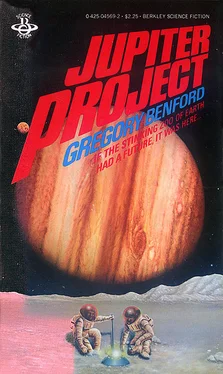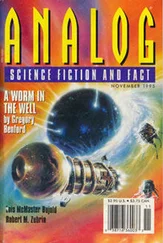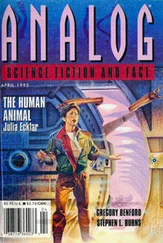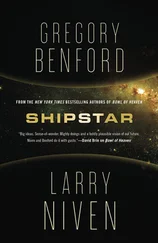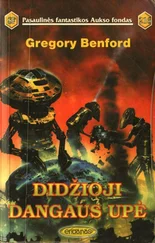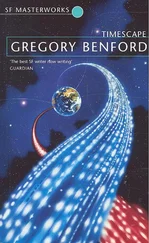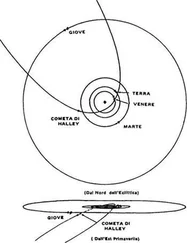When I found the sensor package it needed a new circuit module in its radio; the base had guessed the trouble and told me to carry one along on the walk out. That wasn’t what interested me, though. This particular package was sitting in the middle of a seeded area. Two years ago a team of biologists planted an acre of microorganisms around it. The organisms were specially tailored in the Lab to live under Ganymede conditions and—we hoped—start producing oxygen, using sunlight and ice and a wisp of atmosphere.
I was a little disappointed when I didn’t find a sprawling green swath. Here and there were patches of gray in the soil, so light you couldn’t really be sure they were there at all. Over most of the area there was nothing; the organisms had died.
The trouble with being an optimist is that you get to expect too much. The fact that anything could live out here was a miracle of bioengineering. I shrugged and turned back the way I had come.
I was almost halfway back to the Cat when I felt an itching in the back of my throat. My eyes flicked down at the dials mounted beneath my transparent viewscreen. The humidity indicator read zero. I frowned.
Every suit has automatic humidity control. You breathe out water vapor and the sublimator subsystem extracts some of it before passing the revived air back to you. The extra water is vented out the back of the suit. You’d think that if the microprocessor running the subsystem failed, you’d get high humidity.
But I had too little. In fact, none.
I flipped down my rear lightpipe and squinted at my backpack. Water dripped from the lower vent. I checked my—
Dripped? I looked at it again.
That shouldn’t happen. The suit should have been venting water slowly, so it vaporized instantly when it reached the extremely thin atmosphere outside. Dripping meant the relief valve was open and all my water had been purged.
I called up a systems review on my side viewplate, just below eye level inside my helmet. From the data train I guessed the humidity control crapout had been running for over half an hour. That was what had made the popping noise. And I had written it off as a micrometeoroid. Wishful thinking.
I stepped up my pace. The tickle at the back of my throat meant I might have suit throat. That’s the coverall name for anything related to breathing processed air. If you get contaminants in the mix, or just lose water vapor, your throat and nose soon dry out, or get irritated. A dry throat is a feasting ground for any bacteria hanging around. If you’re lucky, the outcome is just a sore throat that hangs around for a while.
I hustled. Off in the distance I could see the faint aura of orange from a fusion caterpillar. The rising mist from its roaring fusion exhaust diffused the light for tens of klicks. Blue-green shadows in the eroded hillsides contrasted with the gentle orange glow. Suddenly Ganymede felt strange and more than a little threatening.
I was glad when the Cat came within sight. It was backed up to the way station. I clumped up the ladder and wedged through the narrow lock into the cabin.
“You’re in time for the feast.” Yuri said.
“Hope I can taste it.”
“Why?”
I opened my mouth and pointed. Yuri looked in, turned my head toward the light, looked again. “It is a little red. You should look after it.”
I got out the first-aid kit and found the anesthetic throat spray. It tasted metallic but it did the job; after a moment it didn’t hurt to swallow.
I broke down the humidity control unit in my suit. Sure enough, the microprocessor had a fault. I look a replacement chip slab out of storage and made the change. Everything worked fine.
I was surprised at how much Yuri could do with our rations. We had thin slices of chicken in a thick mushroom sauce, lima beans that still had some snap in them, and fried rice. We topped it off with strawberry cream cake and a mug of hot tea. Pretty damned elegant, considering.
“My compliments,” I said. “That was undoubtedly the best meal within a million miles.” I felt giddy.
“Some compliment,” Yuri said. “That means I’m better than the base cafeteria.”
I got up from the pullout shelf that we used for a table. The room began to revolve. I put out my hand to steady myself.
“Say!” Yuri shouted. He jumped up and grabbed my arm. The room settled down again.
“I—I’m okay. A little dizzy.”
“You’re pale.”
“The light is poor in ultraviolet here. I’m losing my suntan.” I said woozily.
“It must be more than that.”
“You’re right. Think I’ll go to bed early.”
“Take some medicine. I think you have suit throat.”
I grinned weakly. “Maybe it’s something I ate.” I jerked on the pull ring and my foldout bunk came down. Yuri brought the first-aid kit over. I sat on the bunk taking off my clothes and wondered vaguely where second aid would come from if the first aid failed. I shook my head: the thinking factory had shut down for the night. Yuri handed me a pill and I swallowed it. Then a tablet, which I sucked on. Finally I got between the covers and found myself studying some numbers and instructions that were stenciled on the ceiling of the cabin. Before I could figure out what they meant I fell asleep.
The morning was better, much better. Yuri woke me and gave me a bowl of warm broth. He sat in a deck chair and watched me eat it.
“I must call the base soon,” he said.
“Um.”
“I have been thinking about what to say.”
“Um… Oh. You mean about me?”
“Yes.”
“Listen, if Captain Vandez thinks I’m really sick he’ll scrub the rest of the trip. We’ll have to go back.”
“So I thought.”
“Do me a favor, will you? Don’t mention this when you call in. I’m feeling better. I’ll be okay.”
“Well—”
“Please?”
“All right. I don’t want this journey ruined just because you are careless.” He slapped his knees and got up. “I will make the call.”
“Mighty nice of you,” I mumbled. I dozed for a while. I was feeling better, but I was a little weak. I heard Yuri talking to Zak briefly. I ran over the route we would follow that day. The next way station was a respectable distance away and there was only one sensor package to visit. We would have to spend our time making tracks for the next station—which was just as well, with one crew member on the woozy side.
“Yuri,” I said, “check and be sure we got our tanks filled with air and water. It’s a long way to the next—”
“Bohles, you may be sick but that doesn’t mean you can start ordering me around. I will get us there.”
I rolled over and tried to go to sleep. I heard Yuri suit up and go out. A little later there were two faint thunks as the hoses disconnected from the way station. Then Yuri came back in, unsuited and sat down in the driver’s chair.
The Cat lurched forward and then settled down to a steady pace. I decided to stop worrying and let Yuri handle things for a while. I was feeling better every minute, but another forty winks wouldn’t do any harm. I let the gentle swaying of the Walker rock me to sleep.
I woke around noon; I must have been more tired than I thought. Yuri tossed me a self-heating can of corned beef; I opened it and devoured the contents immediately.
I passed the next hour or so reading a novel. Or rather, I tried. I dozed off and woke up in mid-afternoon. There was a lot of sedative in that medicine.
I got up, pulled on my coveralls and walked over to the control board. “Walked” isn’t quite the right word—with my bunk and the table down, the Cat resembled a roomy telephone booth.
I sat down next to Yuri. We were making good time across a flat, black plain. There was an inch or so of topsoil—dust, really—that puffed up around the Cat’s feet as they stepped. The dust comes from the cycle of freezing and thawing of ammonia ice caught in the boulders. The process gradually fractures the Ganymede rock, breaking it down from pebbles to shards to BB shot to dust. In a century or so somebody will grow wheat in the stuff.
Читать дальше
